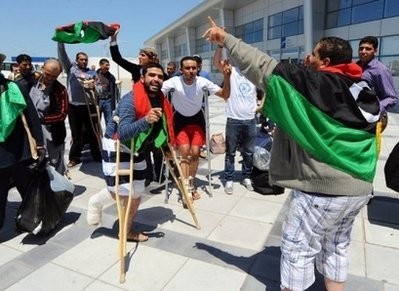TRIPOLI (AFP) – International powers have pledged funds to aid Libyan rebels in their battle to oust strongman Moamer Kadhafi, a move swiftly denounced by the Tripoli regime.
The move Thursday came as more than 1,000 refugees arrived in the eastern rebel bastion of Benghazi after fleeing the besieged city of Misrata under fire.

Kadhafi's forces have tightened the noose on Misrata, killing at least five people on Wednesday, in a more than two-month nationwide revolt that the International Criminal Court said has cost "thousands" of lives.
Leaders of the rebellion against Kadhafi said the pledges, made at a meeting in Rome of the International Contact Group and to come mainly from Kuwait and Qatar, were "a good start."
The fund will initially receive international donations, while blocked assets -- estimated to be worth $60 billion (40 billion euros) in Europe and the United States -- will be used to finance it at a later date.
France and Italy said they would alternate managing the fund. French Foreign Minister Alain Juppe said the new body could be up and running "within weeks," but that the unblocking of assets "poses legal problems".
Italian Foreign Minister Franco Frattini, host of the Rome meeting, said Italy and France had urged the European Union "to seek a solution", adding: "That money belongs to the Libyan people."
Frattini said $250 million was already available in immediate humanitarian aid -- far less than the figure of up to $3 billion dollars in desperately needed credit wanted by the rebels.
"It's a good start," Mahmud Jibril, leader of the opposition Transitional National Council (NTC), said after the talks.
Jibril said the three-billion figure was in fact "a six-month budget."
Expressing a degree of impatience over the frozen assets, he added: "This process should be expedited because having this money soon would help us come up with what we call a roadmap to realise our developmental vision."
Jibril outlined a political plan that would be enacted if Kadhafi leaves power in which an interim government would hold a referendum on a new constitution and parliamentary and presidential elections within eight months.
The rebel chief said the NTC would soon contact the United Nations to organise municipal elections imminently in the cities that it already controls as a way of showing its commitment to democratic change in Libya.
The government that would oversee this entire process would be made up of NTC members, technocrats from Kadhafi's regime, senior military and intelligence officers and a judge.
Libya denounced the action to fund rebels.
"Libya still, according to the international law, is one sovereign state and any use of the frozen assets, it's like piracy on the high seas," Khaled Kaim told a news conference in Tripoli.
Meanwhile, the rebels were left red-faced after they claimed that four more countries -- Canada, Denmark, the Netherlands and Spain -- had recognised them. Foreign ministries in Copenhagen, the Hague and Madrid quickly denied the claim.
Canada see rebels trying to overthrow Kadhafi as a "valid interlocutor," but denied the fighters' claims that Ottawa had formally recognised them as the new government.
France, Italy, Qatar and Gambia earlier recognised the NTC.
There was talk of a diplomatic solution to the conflict on Thursday, but few concrete details emerged from the meeting. Frattini later told Italian radio only that he thought a ceasefire within weeks was "a realistic period."
US Secretary of State Clinton emphasised that the international community must do more to isolate Kadhafi's regime by expelling all diplomats loyal to him -- a call that coincided with Britain ordering two Libyan envoys to quit London.
Washington also announced it was slapping sanctions on Libya's state broadcaster and two government-controlled investment firms.
The contact group, which includes all the countries participating in the NATO-led campaign, met amid stalemate in a conflict that has already killed 10,000 people according to rebels.
In Libya, meanwhile, an aid ship chartered by the International Organisation for Migration brought out 50 wounded passengers and a group of 20 journalists to Benghazi, the IOM said.
IOM staff in Geneva said they could clearly hear the sound of gunfire while they were in touch by satellite phone with their colleagues at the port during "heavy shelling" in Misrata on Wednesday.
Misrata has been surrounded by Kadhafi's forces for the past two months, with intense fighting as the two sides battle for control and as NATO mine-sweepers scour the waters offshore.
With the airport in government hands, the rebels are entirely dependent on supply by sea.
In the capital Tripoli, leaders from some 850 loyalist tribes including those from the rebel-held east packed a massive tent for speeches by representatives of various regions of the country.
They generally called for Libyan unity and national dialogue, along with varying degrees of praise for the Kadhafi regime and criticism of NATO, which took command of strikes against government forces on March 31.
























